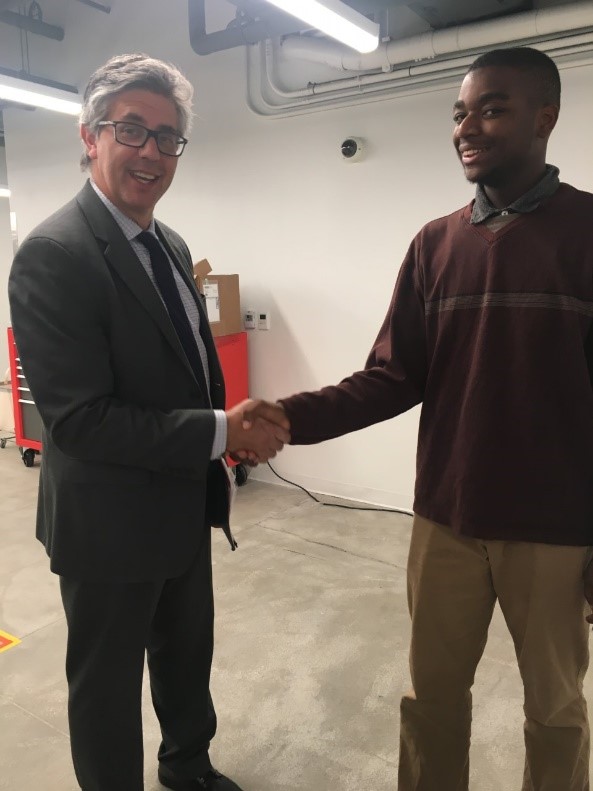Disability Inclusion: A New Talent Strategy
By Dahrah Muhammad, Transition Pathways, Student Worker
Posted on
November 14, 2019
On November 4th, Transition Pathways of the A.J. Drexel Autism Institute in partnership with Community Integrated Services hosted an event to promote inclusive hiring practices for those with autism and other disabilities. The room was filled with representatives from over 25 businesses, government organizations, universities and community agencies all looking for ways to create a more inclusive workforce.
Dianne Malley, project director for Transition Pathways, began the event with welcoming remarks, “This event marks the official launch of the Business Inclusion Center.” The Business Inclusion Center led by Transition Pathways in collaboration with Community Integrated Services and national disability inclusion expert James Emmett, of James Emmett and Company, assists businesses in building their internal capacity to recruit, hire, train and retain employees on the autism spectrum and with other disabilities. The focus is on business’ bottom line by creating a diverse workforce of qualified workers to support companies’ diversity, equity and inclusion goals.
The discussion began as Paul Shattuck, PhD, director of Life Course Outcomes at the A.J. Drexel Autism Institute, set the tone that this isn’t about charity. Creating employment opportunities for those who are intellectually or developmentally disabled, allows an individual’s potential to be unleashed, Shattuck advised. He continued to list the positives of inclusive hiring practices including lower employee turnover rates and an uptick in overall company culture and morale. Shattuck revealed poor employment rates for those on the autism spectrum in the National Autism Indicators Report of 2015, which led to the formation of the Transition Pathways Initiative. This initiative convenes partnerships with schools, organizations, businesses and community stakeholders to develop innovative approaches to help young adults on the autism spectrum achieve a successful transition and positive employment outcomes.
 Director Craig E. Leen shaking hands with Stephen Fagans, Project SEARCH intern
Director Craig E. Leen shaking hands with Stephen Fagans, Project SEARCH intern
Director Craig E. Leen of the Office of Federal Contract Compliance Programs with the U.S. Department of Labor followed Shattuck. As a leader in the U.S. Department of Labor and as a parent of young adults on the autism spectrum, he spoke passionately about the importance of disability inclusion in the workplace and specifically within organizations with federal contracts. Leen emphasized the importance of accommodations and career advancement for those with disabilities. His keynote address focused on the need for companies to make better efforts in their disability hiring practice and offered advice for businesses to make this happen. Moving forward, Leen is leading the charge in conducting reviews of federal contractors and holding companies accountable who are not following the legal requirements as put forth by Section 503 of the Rehabilitation Act.
After listing some best practices for companies to implement, he ended his address with a personal story about his daughter. Sharing that the two of them frequently run together on trails near their home and as an avid marathon runner, he participated in the Marine Core Marathon for the second time in 10 years. After running nine marathons, he wished for the 10th to be the one he ran with his daughter. This year, the Marine Core Marathon opened a category for dual runners, where a runner could push someone using a special running wheelchair. The number of participants using this kind of wheelchair was overwhelming. “If a marathon can be inclusive, then why can’t a workplace?” Leen reflected.
An expert panel moderated by James Emmett, who has advised companies such as Walgreens and Best Buy regarding hiring and inclusion best practices, was next.
Other panelists included Scott Michael Robertson, PhD, an autistic adult and a policy advisor with the Office of Disability Employment Policy (ODEP); Tiffany Jameson, founder of Grit and Flow, and a mother of an autistic child; Stephon Gray, a former Project SEARCH intern, who now holds an administrative assistant role with Stitch Data;
Lucinda West, the ADA coordinator and HR specialist with the Philadelphia International Airport who after serving on the advisory council for Project SEARCH hired four program graduates to work at PHL Airport; and Giovanni Carrion who is a current Transition Pathways Project Career Launch student. Panelists discussed challenges individuals with autism and other disabilities sometimes face in the workplace and the importance of self-advocacy, good organizational systems and inclusive programs to ensure success. Robertson emphasized a previous point made by Leen that most accommodations cost the company nearly nothing. Jameson shared her thoughts based on the experiences she has had with her son and homed in on the concept of “Universal Design.” With Universal Design, certain accommodations or practices initially intended to help one individual may contribute to a better workforce for all. In doing so, you are creating an atmosphere that brings everyone’s best self forward, Jameson stated. This was confirmed by Gray’s own experience with his current position.
 From left to right, James Emmett, Dr. Scott Michael Robertson, Tiffany Jameson, Stephon Gray, Lucinda West, and Giovanni Carrion.
From left to right, James Emmett, Dr. Scott Michael Robertson, Tiffany Jameson, Stephon Gray, Lucinda West, and Giovanni Carrion.
When asked by Emmett, “What does it take to have inclusive practices in the workplace?” Gray simply answered, “Hard work and determination.” He discussed how there have been moments when he had made mistakes, but due to being in an environment where they didn’t punish him but rather gave him the opportunity to learn from them, he continued to do his best until he became one of the best in his role. The room raised their hands with a silent applause in appreciation of the panel’s contribution to the discussion.